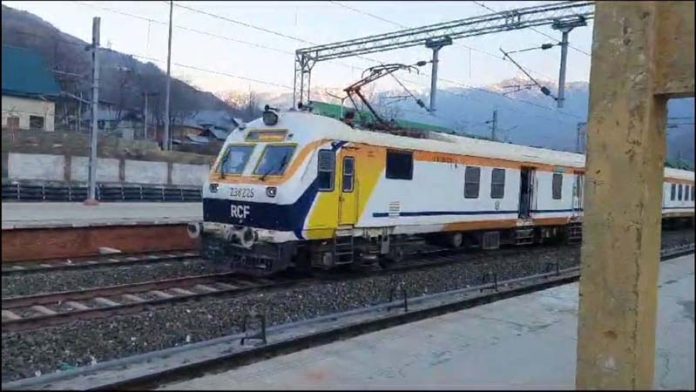NEW DELHI, Apr 5 : Italian certification and inspection service provider ItalCertifer has conducted a four-day independent safety assessment of the Kavach system installed between the Mathura and Palwal sections in the Agra Rail Division.
Kavach is an anti-train collision system that can apply the brakes automatically in case of an emergency when the driver fails to act.
According to the Agra division, the assessment started on March 19 under the supervision of Kush Gupta, Deputy Chief Signal and Telecommunication Engineer, North Central Railway, and went on till March 23, with a train set that had a high-speed engine and 10 LHB coaches.
“The train started at 9 am from the Rundhi station and reached Vrindavan at 10:15 am. During the journey, Kavach’s functional efficiency in stopping the train before the red signals without the driver’s interference and loop line control test were assessed,” Prashashti Srivastava, Public Relations Officer (PRO), Agra Rail Division, said.
“A similar exercise was carried out in the down direction of the train from Vrindavan to Rundhi from 11 am to 12:10 pm for four days,” she added.
According to Srivastava, ItalCertifer is one of the safety assessors on the panel of the Research Designs and Standards Organisation (RDSO) and it will take about a month to come out with the report based on which corrective actions will be taken, if required.
“The assessment exercise went on very well under the able supervision of our Deputy Chief Signal and Telecommunication Engineer Kush Gupta. We are waiting for its report now,” Srivastava said, adding that the safety assessor was designated by the RDSO from its panel of assessors.
Earlier, the functioning of the Kavach system was tested in this section at various train speeds ranging from 130 kmph to 160 kmph.
The Agra division under the NCR zone has developed a complete Kavach network on the 80-km stretch between Mathura (excluding the station) and Palwal. This involves the placement of RFID tags on railway tracks in station areas and other places.
Installation of stationary Kavach units at several places, such as stations, and of tower and antenna along the tracks were also essential components of this anti-train collision system.
According to a railway official, across the country’s rail network, a 125-km stretch in three parts between Delhi and Agra is the only stretch where trains can run at a maximum speed of 160 kmph.
The special track was laid here for the country’s first semi-high-speed train, Gatimaan Express, which was launched on this route in April 2016. It is India’s first train that runs at a speed of 160 kmph.
According to the railways, the Kavach system is already functional in three sections on 1,465 route km and 139 locomotives in the South Central Railway. However, the trial cannot be carried out on that route because of speed restrictions.
“Except this Delhi-Agra stretch, trains run at a maximum speed of 130 kmph across all rail networks in India,” the official said.
Kavach is an automatic train protection system for enhancing the safety of running trains. It has been developed indigenously by the RDSO, in association with three Indian vendors.
Kavach not only helps loco pilots avoid signal passing at danger and over-speeding, but also helps in train running during inclement weather such as dense fog, leading to enhanced safety and efficiency of train operations.
Some features of the system are controlling the speed of trains by automatic application of the brakes in case the loco pilot fails to apply the brakes and repeating line-side signals in the cab, which is very useful for higher speeds. (PTI)


